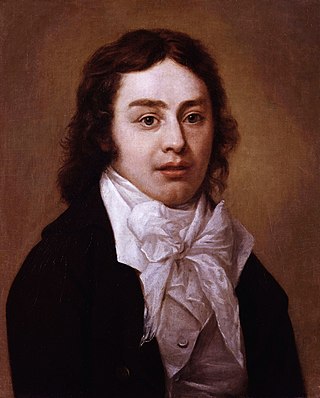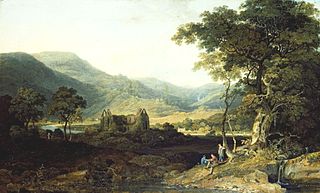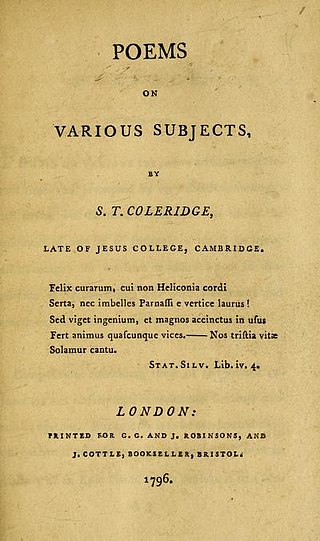
Kubla Khan is a poem written by Samuel Taylor Coleridge, completed in 1797 and published in 1816. It is sometimes given the subtitles "A Vision in a Dream" and "A Fragment." According to Coleridge's preface to Kubla Khan, the poem was composed one night after he experienced an opium-influenced dream after reading a work describing Shangdu, the summer capital of the Mongol-led Yuan dynasty of China founded by Kublai Khan. Upon waking, he set about writing lines of poetry that came to him from the dream until he was interrupted by "a person from Porlock". The poem could not be completed according to its original 200–300 line plan as the interruption caused him to forget the lines. He left it unpublished and kept it for private readings for his friends until 1816 when, at the prompting of Lord Byron, it was published.

Samuel Taylor Coleridge was an English poet, literary critic, philosopher, and theologian who, with his friend William Wordsworth, was a founder of the Romantic Movement in England and a member of the Lake Poets. He also shared volumes and collaborated with Charles Lamb, Robert Southey, and Charles Lloyd.

William Wordsworth was an English Romantic poet who, with Samuel Taylor Coleridge, helped to launch the Romantic Age in English literature with their joint publication Lyrical Ballads (1798).

The Rime of the Ancient Mariner is the longest major poem by the English poet Samuel Taylor Coleridge, written in 1797–1798 and published in 1798 in the first edition of Lyrical Ballads. Some modern editions use a revised version printed in 1817 that featured a gloss. Along with other poems in Lyrical Ballads, it is often considered a signal shift to modern poetry and the beginning of British Romantic literature.

Lines Written a Few Miles above Tintern Abbey is a poem by William Wordsworth. The title, Lines Writtena Few Miles above Tintern Abbey, on Revisiting the Banks of the Wye during a Tour, July 13, 1798, is often abbreviated simply to Tintern Abbey, although that building does not appear within the poem. It was written by Wordsworth after a walking tour with his sister in this section of the Welsh Borders. The description of his encounters with the countryside on the banks of the River Wye grows into an outline of his general philosophy. There has been considerable debate about why evidence of the human presence in the landscape has been downplayed and in what way the poem fits within the 18th-century loco-descriptive genre.
Nationality words link to articles with information on the nation's poetry or literature.
On Receiving an Account that his only Sister's Death was Inevitable was composed by Samuel Taylor Coleridge in 1794, and deals with the death of Coleridge's step-sister Ann (1791), as well as that of his brother Luke (1790). A later poem, was written for Coleridge's friend Charles Lamb and seeks to comfort him after the loss of his sister.
The Destiny of Nations was composed by Samuel Taylor Coleridge as part of Robert Southey's Joan of Arc epic poem. The lines were later isolated from Southey's and expanded. The new poem includes Coleridge's feelings on politics, religion, and humanity's duty to helping each other.

The conversation poems are a group of at least eight poems composed by Samuel Taylor Coleridge (1772–1834) between 1795 and 1807. Each details a particular life experience which led to the poet's examination of nature and the role of poetry. They describe virtuous conduct and man's obligation to God, nature and society, and ask as if there is a place for simple appreciation of nature without having to actively dedicate one's life to altruism.
The Eolian Harp is a poem written by Samuel Taylor Coleridge in 1795 and published in his 1796 poetry collection. It is one of the early conversation poems and discusses Coleridge's anticipation of a marriage with Sara Fricker along with the pleasure of conjugal love. However, The Eolian Harp is not a love poem and instead focuses on man's relationship with nature. The central images of the poem is an Aeolian harp, an item that represents both order and wildness in nature. Along with the harp is a series of oppositional ideas that are reconciled with each other. The Eolian Harp also contains a discussion on "One Life", Coleridge's idea that humanity and nature are united along with his desire to try to find the divine within nature. The poem was well received for both its discussion of nature and its aesthetic qualities.
"This Lime-Tree Bower My Prison" is a poem written by Samuel Taylor Coleridge during 1797. The poem discusses a time in which Coleridge was forced to stay beneath a lime tree while his friends were able to enjoy the countryside. Within the poem, Coleridge is able to connect to his friend's experience and enjoy nature through him, making the lime tree only a physical prison, not a mental one.
Frost at Midnight is a poem by Samuel Taylor Coleridge, written in February 1798. Part of the conversation poems, the poem discusses Coleridge's childhood experience in a negative manner and emphasizes the need to be raised in the countryside. The poem expresses hope that Coleridge's son, Hartley, would be able to experience a childhood that his father could not and become a true "child of nature". The view of nature within the poem has a strong Christian element in that Coleridge believed that nature represents a physical presence of God's word and that the poem is steeped in Coleridge's understanding of Neoplatonism. Frost at Midnight has been well received by critics, and is seen as the best of the conversation poems.
Fears in Solitude, written in April 1798, is one of the conversation poems by Samuel Taylor Coleridge. The poem was composed while France threatened to invade Great Britain. Although Coleridge was opposed to the British government, the poem sides with the British people in a patriotic defense of their homeland. The poem also emphasizes a desire to protect one's family and to live a simple life in harmony with nature. The critical response to the poem was mixed, with some critics claiming that the work was "alarmist" and anti-British.
The Nightingale: A Conversation Poem is a poem written by Samuel Taylor Coleridge in April 1798. Originally included in the first edition of Lyrical Ballads, which he published with William Wordsworth, the poem disputes the traditional idea that nightingales are connected to the idea of melancholy. Instead, the nightingale represents to Coleridge the experience of nature. Midway through the poem, the narrator stops discussing the nightingale in order to describe a mysterious female and a gothic scene. After the narrator is returned to his original train of thought by the nightingale's song, he recalls a moment when he took his crying son out to see the moon, which immediately filled the child with joy. Critics have found the poem either decent with little complaint or as one of his better poems containing beautiful lines.
To William Wordsworth is a poem by Samuel Taylor Coleridge written in 1807 as a response to poet William Wordsworth's autobiographical poem The Prelude, called here "that prophetic lay". Wordsworth had recited that poem to his friend Coleridge personally. In his poem, Coleridge praises Wordsworth's understanding of both external and human nature, at the same time emphasizing Wordsworth's poetic achievement and downplaying his own.
France an Ode was written by Samuel Coleridge in April 1798. The poem describes his development from supporting the French Revolution to his feelings of betrayal when they invaded Switzerland. Like other poems by Coleridge, it connects his political views with his religious thoughts. The Gothic elements of the poem connect the poem's style to many of his early poetic works.

"The Virgin's Cradle Hymn" is a short lullaby text. It was collected while on a tour of Germany by the English poet Samuel Taylor Coleridge, and published in his Sibylline Leaves of 1817. According to his own note, Coleridge copied the Latin text from a "print of the Blessed Virgin in a Catholic village in Germany", which he later translated into English. The text, actually from a collection of devotional Flemish engravings by Hieronymus Wierix, has inspired a number of modern choral and vocal musical settings.

Poems on Various Subjects (1796) was the first collection by Samuel Taylor Coleridge, including also a few sonnets by Charles Lamb. A second edition in 1797 added many more poems by Lamb and by Charles Lloyd, and a third edition appeared in 1803 with Coleridge's works only. All three editions included poems in Coleridge's early Miltonic style, such as his Religious Musings and Monody on the Death of Chatterton, alongside lyrics and some of his first conversation poems, such as The Eolian Harp, in a style suggested by the works of William Cowper. The book was on the whole well received by reviewers; modern critics value it more for its shorter and lighter poems than for its formal set-pieces.
"Time, Real and Imaginary. An Allegory" is a short poem of 11 lines written by Samuel Taylor Coleridge at an uncertain date, and first published in 1817.
"Lewti, or the Circassian Love-chaunt" is a poem by Samuel Taylor Coleridge, first published in 1798.









